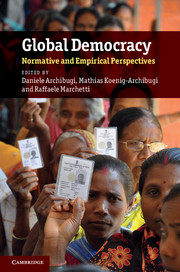
-
Select format
-
- Publisher:
- Cambridge University Press
- Publication date:
- 05 June 2012
- 27 October 2011
- ISBN:
- 9780511977992
- 9780521197847
- 9780521174985
- Dimensions:
- (228 x 152 mm)
- Weight & Pages:
- 0.62kg, 310 Pages
- Dimensions:
- (228 x 152 mm)
- Weight & Pages:
- 0.5kg, 310 Pages
- Subjects:
- Political Theory, Political Sociology, Politics and International Relations, Sociology
You may already have access via personal or institutional login- Subjects:
- Political Theory, Political Sociology, Politics and International Relations, Sociology
Book description
Democracy is increasingly seen as the only legitimate form of government, but few people would regard international relations as governed according to democratic principles. Can this lack of global democracy be justified? Which models of global politics should contemporary democrats endorse and which should they reject? What are the most promising pathways to global democratic change? To what extent does the extension of democracy from the national to the international level require a radical rethinking of what democratic institutions should be? This book answers these questions by providing a sustained dialogue between scholars of political theory, international law and empirical social science. By presenting a broad range of views by prominent scholars, it offers an in-depth analysis of one of the key challenges of our century: globalizing democracy and democratizing globalization.
Reviews
‘Is global democracy a chimera, an oxymoron, or a utopia? The wide-ranging views in this book are essential reading for those seeking answers - opponents resisting the move beyond individual states as well as for proponents looking for future pathways toward supranational governance with fewer political inequalities.’
Thomas G. Weiss - Presidential Professor of Political Science, The Graduate Center, The City University of New York
‘This is an ambitious, well conceived, and important book that brings together normative and empirical perspectives on the notion of global democracy. The best scholars in the field illuminate the need to democratize international authority and analyze both the opportunities and limits of such an endeavor.’
Michael Zürn - Director, The Social Science Research Center Berlin (WZB), and Professor for International Relations, Free University of Berlin
Contents
Metrics
Altmetric attention score
Full text views
Full text views help Loading metrics...
Loading metrics...
* Views captured on Cambridge Core between #date#. This data will be updated every 24 hours.
Usage data cannot currently be displayed.
Accessibility standard: Unknown
Why this information is here
This section outlines the accessibility features of this content - including support for screen readers, full keyboard navigation and high-contrast display options. This may not be relevant for you.
Accessibility Information
Accessibility compliance for the PDF of this book is currently unknown and may be updated in the future.


